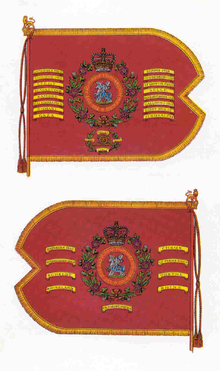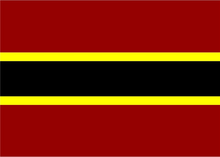Fife and Forfar Yeomanry/Scottish Horse
| Fife and Forfar Yeomanry/Scottish Horse | |
|---|---|
|
Cap badge of the FFY/SH | |
| Active | 1956-Present |
| Country |
|
| Branch | Territorial Army |
| Type | Yeomanry |
| Role | Formation Reconnaissance |
| Size | Since 1992 only one squadron |
| Part of | Queen's Own Yeomanry |
| Garrison/HQ |
HQ at Yeomanry House Cupar Detachment in Forfar |
| Nickname(s) | The Highland Cavalry |
| Motto(s) | Pro Aris et Focis (For Hearth and Home) |
| March |
Quick - Wee Cooper of Fife (band); The Scottish Horse (pipes and drums) Slow - The Garb of Old Gaul (band); Bonnie Dundee (pipes and drums) |
| Commanders | |
| Honorary Colonel | Colonel Sir John Gilmour Bt. DL |
| Notable commanders |
Duke of Atholl Sir John Gilmour 2nd Bt Sir John Gilmour, 3rd Bt Earl of Lindsay |
| Insignia | |
| Tartan | Murray of Atholl |
The Fife & Forfar Yeomanry/Scottish Horse (FFY/SH) is a Yeomanry Squadron of the Queen's Own Yeomanry part of the British Territorial Army. It was formed following the amalgamation of The Fife and Forfar Yeomanry and The Scottish Horse regiments.
The squadron is C Squadron of the Queen's Own Yeomanry which is assigned to the 15 (North East) Brigade, 2nd Division. Because of the geographic spread of the regiment C Squadron is administered by 51st (Scottish) Brigade.
The Queen's Own Yeomanry is the only yeomanry regiment that serves in the formation reconnaissance role, equipped with the Scimitar and Spartan armoured reconnaissance vehicles. On mobilisation, it would reinforce one of the regular army formation reconnaissance regiments. The squadron provided personnel for active service during Operation TELIC, where they served with their regular counterparts in the Royal Armoured Corps.
The FFY/SH and its antecedent Regiments have won numerous battle honours and one Victoria Cross.
Organisation
C (FFY/SH) Squadron QOY is based at Yeomanry House on Castlebank Road in Cupar and consists of a Squadron Headquarters Element (SHQ), two Sabre Troops, a Squadron Quarter Master Sergeant (SQMS) Department and a REME Light Aid Detachment (LAD).
One additional troop is located at Strathmore Cavalry Barracks in Forfar but is administered from the Cupar SHQ.
The squadron is supported by Adjutant General's Corps clerks, Royal Logistics Corps chefs and Royal Army Medical Corps medics.
The TA officers and soldiers hold all of the command appointments but on a day-to-day basis the unit is managed by a team of Non-Regular Permanent Staff (NRPS), Permanent Staff Instructors (PSIs) (SNCO instructors posted from the Regular Army) and civil servants.
History
The Regiment 1956-1967
On 1 November 1956 The Fife and Forfar Yeomanry/Scottish Horse was formed by the amalgamation of two Royal Armoured Corps Regiments: The Fife and Forfar Yeomanry (FFY) which traces it history back to 1793 and The Scottish Horse (SH) which is unique in that it was originally raised, not in Scotland, but in South Africa in 1900.
The FFY/SH received all its staff instructors, RSM and Adjutants from the 4th/7th Royal Dragoon Guards.
The FFY/SH was the only armoured regiment in 51st (Highland) Division in this period and whilst not mobilised as a Regiment it did despatch some individuals as replacements on operational tours with the 4th/7th Royal Dragoon Guards during the Aden Emergency.
The Cadre 1967-1975
In 1967 the Regiment was put into suspended animation (and not allowed to recruit). A RCT Squadron was formed under the name "Highland Yeomanry" but this was not to take the lineage of the Squadron though they were allowed the honour of wearing the Atholl Bonnet.
By 1969 the FFY/SH Regiment, that was in suspended animation, was reduced to a cadre strength by the Royal Armoured Corps HQ which saw the Regiment continue training but on an unpaid basis and dismounted (its armoured cars had been removed).
During this period the training was basic but assistance from Regular Army Regiments was sought and the FFY/SH continued only so it could be revived in case of national emergency.
The FFY/SH cadre was officially dissolved in 1975.
The Scottish Yeomanry 1992-1999
In 1992, the transport squadron was moved to Glenrothes and Yeomanry House was reclaimed by the Yeomanry with the remaining troops converted back to the reconnaissance role, becoming C Squadron (Fife and Forfar Yeomanry/Scottish Horse) of The Scottish Yeomanry.

In The Queen's Own Yeomanry 1999-present
With the Strategic Defence Review in 1999, The Scottish Yeomanry and The Queen's Own Yeomanry were amalgamated. In 2003 many of the Squadron were mobilised serve in the Invasion of Iraq on Operation TELIC. This was the first large scale call-out of the Territorial Army since the Suez Crisis. Since then the Squadron has had Soldiers and Officers serve in both Iraq and Operation HERRICK in Afghanistan with their regular counterparts in the Royal Armoured Corps and other arms and services. It was announced as part of FR2020 that the Squadron would transfer to a new regiment to be named the Scottish and North Irish Yeomanry
Battle honours
Fife and Forfar Yeomanry/Scottish Horse hold the combined battle honours of The Fife and Forfar Yeomanry, and Scottish Horse.[1] They were displayed on the FFY/SH guidon and are represented today on the guidon of The Queen's Own Yeomanry.
This table shows the FFY/SH Regiment's battle honours and their origin with either the FFY or the SH.
Guidon

The Regiment was presented a new guidon which displayed the combined battle honours of the FFY and the SH on 19 July 1958 at Dundonald Camp by Lieutenant-General R.G. Collingwood.
The guidon was laid up on the 30 November 1975 in Dundee Parish Church (St Mary's).
The guidon was briefly returned to the custody of the FFY/SH squadron in 2007 [4] for a parade to mark the receipt of The Queen's Own Yeomanry's first guidon from The Prince of Wales. They were then returned in brief ceremony to Dundee Parish Church (St Mary's) in late 2007.
The FFY/SH crest appears on the current Queen's Own Yeomanry guidon.
Decorations and awards
The Squadron has one Victoria Cross winner in its history; Lt Col W J English, who was awarded the Victoria Cross for his heroism in 1901 in South Africa whilst serving as a Lieutenant in The Scottish Horse.
Honorary Colonels and Commanding Officers 1956- present
| Honorary Colonels | Commanding Officers /Officer Commanding | |
|---|---|---|
| The FFY/SH Regiment (1956–1967) |
Col R Appleby Bartram MC TD DL(1956-1957[5]) Col Earl of Lindsay DL(1957[6]-1962[7]) Col RMTC Campbell-Preston OBE MC TD JP DL (1962[7]-1967[8]) Col Sir William Walker Kt. TD DL[9] |
Lt Colonel HRS Stewart TD Lt Colonel N Mathewson TD Lt Colonel M Anstice MC |
| The FFY/SH Cadre (1967–1975) |
Col Sir William Walker, Kt TD DL Col Sir John Gilmour Bt DSO TD JP DL MP |
Maj MGN Walker (1969[10]-1972) Maj IS Taylor TD (1972[11]-1975[12]) |
| The FFY/SH Suspended Animation (1975–1992) |
None | None |
| C(FFY/SH) Squadron of The Scots Yeo (1992–1999) |
Col MJC Anstice MC TD DL | Maj C Roads (1992–1994) Maj I Thornton-Kemsley TD (1994–1996) Maj WHR Wilson (1996–1999) |
| C(FFY/SH) Squadron of The QOY (1999–Present) |
Col Sir John Gilmour, 4th Bt (-Present) | Maj WHR Wilson (1999–2000) Maj NWE Potter TD (2000–2002) Maj MC Hutchinson TD (2002–2007) Maj C Chayko (2007–2008) Maj NWE Potter TD (2008–Present) |
Other notable officers in the FFY/SH include:
Seniority in The Queen’s Own Yeomanry
The FFY/SH Squadron is officially recognised as the fourth of five Squadrons in The Queen's Own Yeomanry.
| Preceded by D (Northumberland Hussars) Squadron |
Order of Precedence in The Queen's Own Yeomanry |
Succeeded by B (North Irish Horse) Squadron |
Dress and accoutrements

- Regimental Cap Badge
The cap badge of the FFY/SH is a mounted knight (The Thane of Fife) with a Cross of St Andrews behind. The cross contains both laurel and juniper leaves. It is worn on the collars of the officers and men of the Squadron and on the arms above the chevrons of all Senior non-commissioned officers.
- Crops
The officers and Senior NCOs of the Squadron all carry a riding crop (or the longer schooling whip) when on parade without Sabres or Rifles.
- Tartan
The Regiment's tartan is Murray of Atholl inherited from the Scottish Horse. However, the pipers kilts and plaids are in Tullibardine Tartan.
- Warrant Officer's Dress
Unlike all other ranks the Squadron Sergeant Major (and the SQMS) wear a brown leather cross belt with No 2 Dress, officers cap badges, brown shoes and brown gloves.

- Regimental Head Dress
The FFY/SH regimental headdress was the Atholl Bonnet. A navy tam o’shanter type hat with red, white and green checked band and red tourrie (bobble) on top. This is only seen very rarely with the Atholl Grey mess dress of SNCOs and officers.
- Officer's Side Hat
The officer's side hat is navy with silver piping in a pattern first worn by the Fife Light Horse.
- Stable Belt Colours
The FFY/SH wear a stable belt in the regimental colours of crimson and gold with a black stripe. C (FFY/SH) Squadron QOY wears a stablebelt in the colours of the Queen's Own Yeomanry.
Bands
The FFY/SH regiment had its own both its own brass band and Pipes and Drums.
Today one of the three Royal Armoured Corps bands provides music for parades.
Alliances
 Scotland - Atholl Highlanders
Scotland - Atholl Highlanders Australia - The 1st/15th Royal New South Wales Lancers
Australia - The 1st/15th Royal New South Wales Lancers South Africa - Transvaal Scottish Regiment
South Africa - Transvaal Scottish Regiment
See also
- Category:Fife and Forfar Yeomanry/Scottish Horse officers
- Yeomanry House
- No. 679 (The Duke of Connaught's) Squadron AAC
References
- ↑ The Fife and Forfar Yeomanry/Scottish Horse 1956-present at regiments.org by T.F.Mills at the Wayback Machine (archived 25 February 2007)
- ↑ "The Fife and Forfar Yeomanry at regiments.org by T.F.Mills". Archived from the original on March 1, 2007. Retrieved March 1, 2007.
- ↑ "The Scottish Horse at regiments.org by T.F.Mills". Archived from the original on July 15, 2007. Retrieved July 15, 2007.
- ↑ The Courier article 20 Sept 2007 on Guidon Parade of The Queens Own Yeomanry
- ↑ Viewing Page 2508 of Issue 41054
- ↑ Viewing Page 4151 of Issue 41124
- 1 2 Viewing Page 4359 of Issue 42689
- ↑ Viewing Page 3807 of Issue 44283
- ↑ Viewing Page 3812 of Issue 44283
- ↑ Viewing Page 13662 of Issue 45251
- ↑ Viewing Page 88 of Issue 45867
- ↑ Viewing Page 5515 of Issue 46557
- ↑ Viewing Page 6241 of Issue 41519
.png)